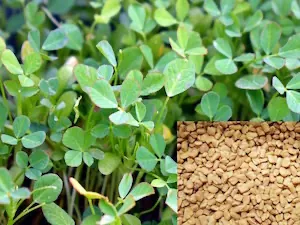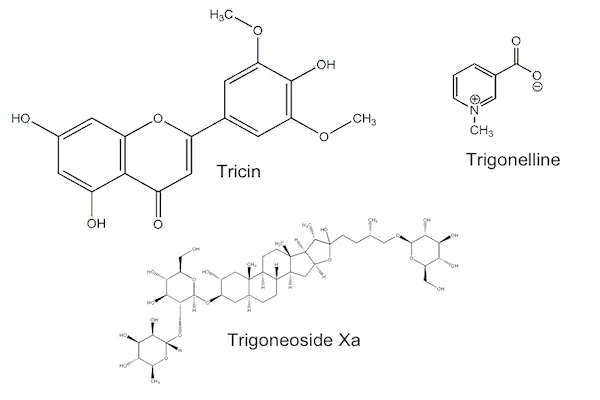Overview of Fenugreek
Scientific Name: Trigonella foenum-graecum
Order: Fabeles
Family: Fabaceae
Fenugreek is an annual herb from Western Asia and South Asia with off-white flowers. Methi is fenugreek in Hindi. The aromatic seeds are often used in Ayurvedic medicine, as well as ground and used as an ingredient in curry or other traditional Hindi foods. Fenugreek seeds are high in B-vitamins, iron, copper, and manganese. The vitamins and minerals in fenugreek seeds contribute to strengthening the body's immune system and supplementing the body with nutrients. Fenugreek seeds have anti-diabetic properties. This medicinal plant reduces intestinal glucose absorption, improves insulin sensitivity, and reduces the absorption of fats; thereby reducing the risk of diabetes. Consuming an appropriate dosage of fenugreek seeds per day lowers blood sugar in people with diabetes. Noticeable changes in blood sugar levels may occur after taking fenugreek for several months. Fenugreek seeds help reduce the risk of heart disease and blood pressure. Potassium in fenugreek helps control heart rate and blood pressure. Phosphorus also regulates heart rate, as well as nerve conductivity. The fiber in the seeds, when entering the body will form a viscous gel in the intestines that makes it easier to digest foods. Consumption of fenugreek may regulate cholesterol levels and blood pressure, which can improve heart health. Fenugreek seeds are also a rich source of dietary fiber (98% daily value [DV]), which helps with smooth digestion, relieves constipation ailments, and better regulates blood sugar levels. Because the seeds increase the feeling of satiety, they may help suppress one's appetite. There is very little evidence that taking fenugreek capsules or fenugreek tea while nursing increases breast milk production. Fenugreek seeds have a sweet, maple syrup-like flavor when they are heated. Dried fenugreek leaves, also known as kasuri methi, can be eaten as well. Combining fenugreek with other spices and/or herbs adds additional flavors and/or textures to stocks, soups, stews, and curries.
Strong:
insufficient informationGood:
- Type 2 Diabetes, a combination of fenugreek and sulfonylureas may also be effective [1-7]
Promising:
- Reduces Dietary Fat Intake/Satiety, consumption of fenugreek dietary fiber or a blend containing fenugreek dietary fiber / guar gum / wheat bran may be effective [8-11]
Conflicting (Unclear):
insufficient informationLimited Evidence:
- Coronary Hearth Disease (CHD), a blend containing fenugreek dietary fiber / guar gum / wheat bran may also be effective [12-13]
- Galactogogue [14-15]
- Type 1 Diabetes [16]
No Evidence:
- Antioxidants in Breast Milk [17]
No Clinical Research:
All other conditions.- Allergic Reactions
- Bleeding
- Bloating
- Bruising
- Headache
- Indigestion
- Maple Syrup Urine Odor
- Use caution and monitor your blood sugar levels, if you are taking fenugreek and have diabetes. If you have low blood sugar symptoms, contact a licensed healthcare practitioner.
- Fenugreek may lower blood sugar levels (hypoglycemia).
- Some people are allergic to fenugreek.
Do not take fenugreek during pregnancy because it may cause uterine contractions. Taking fenugreek during pregnancy may cause the newborn infant to have a maple syrup odor. Fenugreek appears to be safe for consumption in food amounts during pregnancy and breast-feeding. There is not enough research on the use of supplements containing fenugreek during pregnancy and breast-feeding, so consult a licensed healthcare practitioner before use or avoid use. Fenugreek is commonly used during breast-feeding, but again there is not enough research about its safety. [18-23]
Major:
insufficient informationModerate:
- Warfarin
- Anti-Coagulants
- Anti-Diabetes Drugs
- Low Molecular Weight Heparins
- Thrombolytic Agents
Potential:
insufficient informationFenugreek is not a "drug", so the best doses have not been thoroughly established. Make sure to follow the specific product instructions and take as directed on the label, or consult a licensed healthcare practitioner before use.
1. Abdel-Barry JA, Abdel-Hassan IA, Jawad AM, al-Hakiem MH. Hypoglycaemic effect of aqueous extract of the leaves of Trigonella foenum-graecum in healthy volunteers. East Mediterr Health J. 2000 Jan;6(1):83-8. 2. Bordia A, Verma SK, Srivastava KC. Effect of ginger (Zingiber officinale Rosc.) and fenugreek (Trigonella foenumgraecum L.) on blood lipids, blood sugar and platelet aggregation in patients with coronary artery disease. Prostaglandins Leukot Essent Fatty Acids. 1997 May;56(5):379-84. 3. Gupta A, Gupta R, Lal B. Effect of Trigonella foenum-graecum (fenugreek) seeds on glycaemic control and insulin resistance in type 2 diabetes mellitus: a double blind placebo controlled study. J Assoc Physicians India. 2001 Nov;49:1057-61. 4. Kassaian N, Azadbakht L, Forghani B, Amini M. Effect of fenugreek seeds on blood glucose and lipid profiles in type 2 diabetic patients. Int J Vitam Nutr Res. 2009 Jan;79(1):34-9. 5. Losso JN, Holliday DL, Finley JW, Martin RJ, Rood JC, Yu Y, Greenway FL. Fenugreek bread: a treatment for diabetes mellitus. J Med Food. 2009 Oct;12(5):1046-9. 6. Lu FR, Shen L, Qin Y, Gao L, Li H, Dai Y. Clinical observation on Trigonella foenum-graecum L. total saponins in combination with sulfonylureas in the treatment of type 2 diabetes mellitus. Chin J Integr Med. 2008 Mar;14(1):56-60. 7. Madar Z, Abel R, Samish S, Arad J. Glucose-lowering effect of fenugreek in non-insulin dependent diabetics. Eur J Clin Nutr. 1988 Jan;42(1):51-4. 8. Chevassus H, Gaillard JB, Farret A, Costa F, Gabillaud I, Mas E, Dupuy AM, Michel F, Cantié C, Renard E, Galtier F, Petit P. A fenugreek seed extract selectively reduces spontaneous fat intake in overweight subjects. Eur J Clin Pharmacol. 2010 May;66(5):449-55. 9. Chevassus H, Molinier N, Costa F, Galtier F, Renard E, Petit P. A fenugreek seed extract selectively reduces spontaneous fat consumption in healthy volunteers. Eur J Clin Pharmacol. 2009 Dec;65(12):1175-8. 10. Mathern JR, Raatz SK, Thomas W, Slavin JL. Effect of fenugreek fiber on satiety, blood glucose and insulin response and energy intake in obese subjects. Phytother Res. 2009 Nov;23(11):1543-8. 11. Vajifdar BU, Goyal VS, Lokhandwala YY, Mhamunkar SR, Mahadik SP, Gawad AK, Halankar SA, Kulkarni HL. Is dietary fiber beneficial in chronic ischemic heart disease? J Assoc Physicians India. 2000 Sep;48(9):871-6. 12. Bordia A, Verma SK, Srivastava KC. Effect of ginger (Zingiber officinale Rosc.) and fenugreek (Trigonella foenumgraecum L.) on blood lipids, blood sugar and platelet aggregation in patients with coronary artery disease. Prostaglandins Leukot Essent Fatty Acids. 1997 May;56(5):379-84. 13. Vajifdar BU, Goyal VS, Lokhandwala YY, Mhamunkar SR, Mahadik SP, Gawad AK, Halankar SA, Kulkarni HL. Is dietary fiber beneficial in chronic ischemic heart disease? J Assoc Physicians India. 2000 Sep;48(9):871-6. 14. Damanik R, Wahlqvist ML, Wattanapenpaiboon N. Lactagogue effects of Torbangun, a Bataknese traditional cuisine. Asia Pac J Clin Nutr. 2006;15(2):267-74. 15. Turkyılmaz C, Onal E, Hirfanoglu IM, Turan O, Koç E, Ergenekon E, Atalay Y. The effect of galactagogue herbal tea on breast milk production and short-term catch-up of birth weight in the first week of life. J Altern Complement Med. 2011 Feb;17(2):139-42. 16. Sharma RD, Raghuram TC, Rao NS. Effect of fenugreek seeds on blood glucose and serum lipids in type I diabetes. Eur J Clin Nutr. 1990 Apr;44(4):301-6. 17. Kavurt S, Bas AY, Aydemir O, Yucel H, Isikoglu S, Demirel N. The effect of galactagogue herbal tea on oxidant and anti-oxidant status of human milk. J Matern Fetal Neonatal Med. 2013 Jul;26(10):1048-51. 18. DerMarderosian A, Beutler JA. The review of natural products: the most complete source of natural product information. 7th ed. St. Louis, MO, USA: Wolters Kluwer Health; 2012. 19. Ebo DG, Bridts CH, Mertens MH, Stevens WJ. Coriander anaphylaxis in a spice grinder with undetected occupational allergy. Acta Clin Belg. 2006 May-Jun;61(3):152-6. 20. Fetrow CW, Avila JR. The complete guide to herbal medicines. Spring House, PA, USA: Springhouse Corporation; 2000. 21. Gruenwald J, Brendler T, Jaenicke C, editors. PDR for herbal medicines. 4th ed. Montvale, NJ, USA: Thomson Healthcare; 2007. 22. Korman SH, Cohen E, Preminger A. Pseudo-maple syrup urine disease due to maternal prenatal ingestion of fenugreek. J Paediatr Child Health. 2001 Aug;37(4):403-4. 23. Patil SP, Niphadkar PV, Bapat MM. Allergy to fenugreek (Trigonella foenum graecum). Ann Allergy Asthma Immunol. 1997 Mar;78(3):297-300. 24. DerMarderosian A, Beutler JA. The review of natural products: the most complete source of natural product information. 7th ed. St. Louis, MO, USA: Wolters Kluwer Health; 2012. 25. Fetrow CW, Avila JR. The complete guide to herbal medicines. Spring House, PA, USA: Springhouse Corporation; 2000. 26. Gruenwald J, Brendler T, Jaenicke C, editors. PDR for herbal medicines. 4th ed. Montvale, NJ, USA: Thomson Healthcare; 2007. 27. Lambert JP, Cormier J. Potential interaction between warfarin and boldo-fenugreek. Pharmacotherapy. 2001 Apr;21(4):509-12. 28. Afendi FM, Okada T, Yamazaki M, Hirai-Morita A, Nakamura Y, Nakamura K, Ikeda S, Takahashi H, Altaf-Ul-Amin M, Darusman LK, Saito K, Kanaya S. KNApSAcK family databases: integrated metabolite-plant species databases for multifaceted plant research. Plant Cell Physiol. 2012 Feb;53(2):e1.

